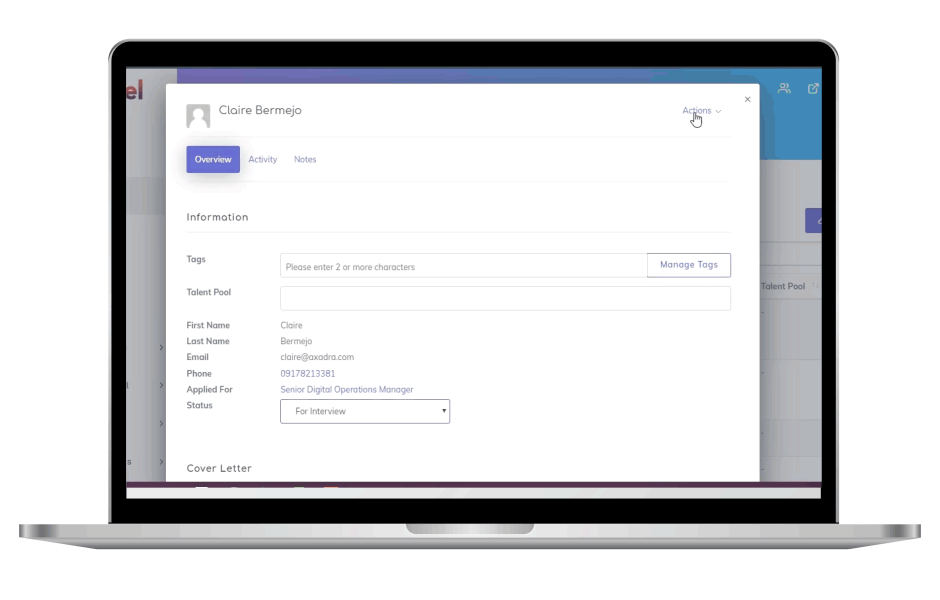The business landscape continues to evolve at an unrelenting pace in 2024. One area at the forefront of this transformation is Human Resources (HR), where technology is playing a pivotal role in reshaping traditional HR practices.
As a recruitment professional, it’s important to stay ahead in this dynamic environment. So, let’s take a look at some of the emerging HR tech trends that are set to shape the industry this year.
What is HR Technology?
HR technology refers to the software, systems, and processes used to streamline HR functions such as recruitment, employee management, learning and development, and payroll processing. It encompasses a wide range of tools – from applicant tracking systems to digital onboarding platforms, performance management systems, and more.
Reasons to Stay Updated With HR Technology Trends
Staying updated with the latest HR technology trends is crucial for businesses to maintain a competitive edge in today’s fast-paced world. In an era where top talents are in high demand, companies that embrace and leverage innovative HR technologies gain a significant advantage.
By incorporating these cutting-edge tools, businesses can attract and retain the best candidates, creating a workforce that drives success. Moreover, these advanced technologies streamline the recruitment process, making it more efficient, effective, and time-saving.
From automated applicant tracking systems to AI-powered employee engagement platforms, the possibilities are endless. By investing in and adopting these HR technologies, businesses can optimize their operations, enhance employee satisfaction, and ultimately achieve long-term success.
HR Technology Trends for 2024
As we delve deeper into 2024, a myriad of cutting-edge HR tech trends will start emerging. Here, we’ll spotlight some of the most influential trends that will likely revolutionize the HR landscape in the near future.
Better Employee Experience
In 2024, there is a significant emphasis on enhancing the employee experience. Human resources technologies have evolved to prioritize employee engagement and satisfaction, leading to the creation of a positive work environment.
By leveraging innovative HR solutions, organizations can foster a culture of collaboration and empowerment, aligning employee goals with business objectives. These advancements in HR technology are expected to drive productivity, boost employee morale, and ultimately, contribute to the overall success of companies in the coming years.
One of the most common tools that recruitment professionals use is the applicant tracking system. This tool will likely see a significant evolution in 2024, with the integration of AI and machine learning capabilities. This enhanced system can automatically screen resumes, identify top candidates, and even predict their retention probability.
Focus on Retaining Employees
As the cost of hiring continues to rise, the future of HR technology promises to enhance employee retention. By implementing regular feedback systems and career development platforms, organizations are utilizing technology to foster employee satisfaction and commitment.
These tools not only provide employees with opportunities for growth and advancement but also create a work environment that promotes engagement and loyalty. Leveraging technology in this way allows companies to effectively retain their valued employees, resulting in a more stable and productive workforce.
Digital Learning and Development
In the realm of digital learning and development, platforms have evolved to become increasingly sophisticated. They now offer personalized learning paths and online certifications, which not only enhance employees’ skills but also contribute significantly to their career growth.
These innovative platforms provide a flexible and accessible way for individuals to acquire new knowledge and competencies, empowering them to stay relevant in today’s rapidly evolving professional landscape. By embracing these opportunities, professionals can unlock their full potential and thrive in their respective fields.
Introduction of New Work Models
The pandemic has brought about the introduction of new work models. HR technologies are rapidly evolving to support these models, which include remote work, flexible schedules, and project-based roles. These changes in the workplace have allowed for greater adaptability and work-life balance.
Companies are now embracing innovative approaches to optimize productivity and employee satisfaction. As we navigate through these challenging times, the evolution of HR technologies will continue to shape the future of work, fostering a more flexible and efficient workforce.
The Rise of Workplace Digitization
Workplace digitization is a growing trend in which companies are adopting digital solutions to streamline their HR processes. By digitizing these processes, organizations aim to enhance efficiency, minimize errors, and gain access to real-time insights.
This transformation allows for smoother and more accurate data management, improved employee experiences, and better decision-making. Embracing workplace digitization can lead to significant benefits for companies, enabling them to stay competitive in today’s rapidly evolving business landscape.
Improving the Hybrid Workplace
As hybrid work becomes the new normal, organizations are increasingly relying on HR technologies to enhance the hybrid workplace experience. This encompasses a wide range of tools and platforms, such as virtual collaboration tools that facilitate seamless remote teamwork, HR recruitment software that streamlines the integration of new employees, and remote performance management systems that ensure effective performance evaluation and feedback.
By leveraging these HR technologies, companies can optimize productivity, foster employee engagement, and adapt to the evolving dynamics of the hybrid work environment.
Transition to Hyper-Personalization
Hyper-personalization in HR technology is becoming increasingly popular as organizations leverage the power of AI and machine learning. By harnessing these technologies, HR systems can provide tailored experiences that cater to the unique needs and preferences of individual employees.
This level of personalization enhances employee engagement, satisfaction, and productivity, ultimately driving organizational success. With the ability to deliver customized solutions, HR technology is transforming the employee experience and revolutionizing the way organizations manage their workforce.
Focus on Diversity, Equity, and Inclusion
There is a noticeable and increasing emphasis on diversity, equity, and inclusion (DEI) in various domains. Human resources (HR) technologies are being specifically developed and designed to foster DEI in the workplace.
These technologies range from recruitment software that aims to eliminate biases to platforms that effectively track and measure diversity metrics. This concerted effort reflects a broader recognition of the importance of DEI and its positive impact on organizations and society as a whole.
Use of AI Tools
The utilization of AI tools in the field of HR is on the rise. AI is now being leveraged for a wide range of HR functions, encompassing recruitment, employee engagement, and predictive analytics.
AI tools offer valuable insights and efficiencies, enabling HR professionals to make informed decisions and drive positive outcomes. With the increasing adoption of AI in HR, organizations can enhance their talent management strategies, improve employee experiences, and optimize workforce planning for better business results.
Movement to the Cloud
Lastly, there is a notable shift towards cloud computing. Many companies are choosing to implement cloud-based HR systems due to their scalability, flexibility, and cost-effectiveness.
With cloud solutions, businesses can easily adapt to changing needs and seamlessly scale their HR operations. Additionally, cloud-based systems offer enhanced data security and accessibility.
By embracing cloud technology, organizations can optimize their HR processes and drive overall efficiency. The cloud revolutionizes HR management, empowering businesses to stay agile and competitive in today’s dynamic market.
The Future of HR Technology
The HR tech landscape in 2024 is dynamic, with numerous trends shaping the future of work. By staying updated with these trends, businesses can leverage technology to attract top talents, streamline their HR processes, and create a positive work environment. As we move forward, it will be exciting to see how these trends evolve and what new technologies emerge in the HR space.














